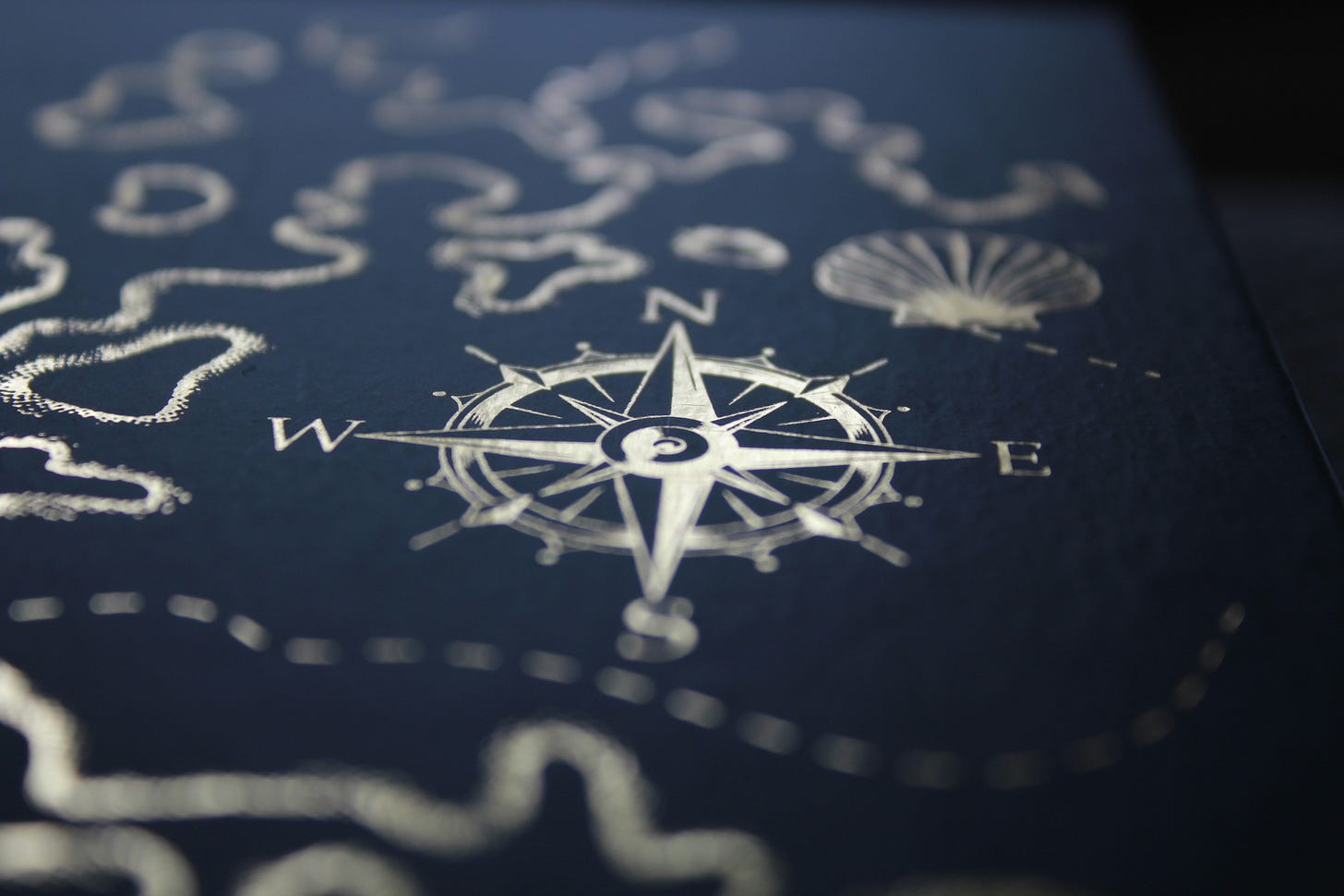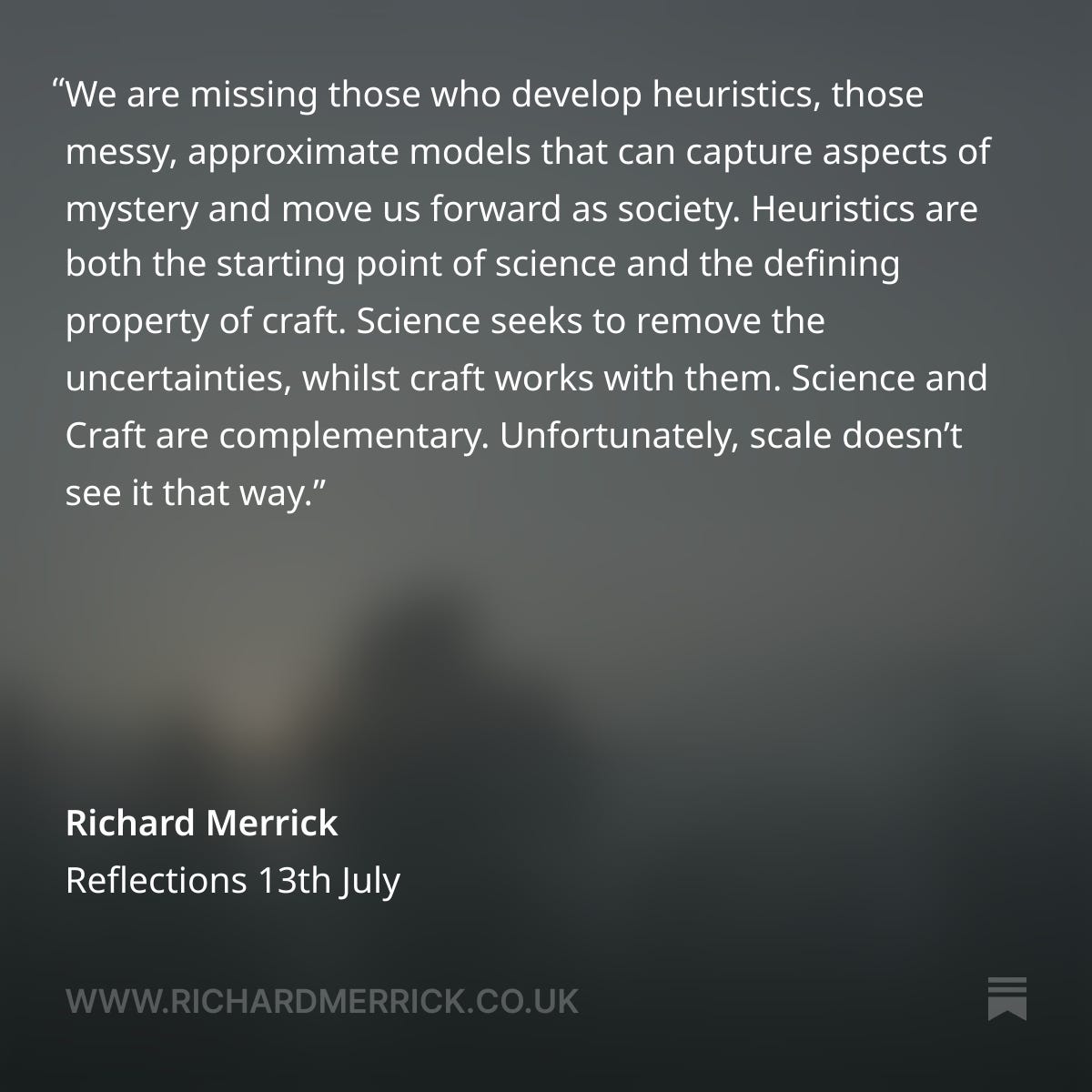Checking our Bearings
moving towards internal navigation
Before we turned navigation from an art to a science, mariners used to be much more circumspect about where they were. They understood that their location in the world could affect their compass. Iron ore deposits, fresh lava flows, and natural electromagnetic currents could all affect readings. In the early days of navigation, they could only discover whether their compass was wrong by using other means, such as dead reckoning or celestial navigation. “Swinging the Compass” was a discipline to recalibrate it regularly.
I think it is a discipline we could usefully discover in the world of work.
In my last post, I started to explore how modern work environments have contracted "gradually and then suddenly," eliminating the informal spaces and time that once allowed us to develop meaningful relationships with our craft. Performative work cultures focused on efficiency and constant connectivity have squeezed out the room for reflection and experimentation that artisans need to thrive, making career decisions feel less authentic and compelling us to find ways of navigating increasingly unpredictable organisational landscapes where progress depends on performance rather than loyalty or creative ideas.
Others have always created the tools we use to navigate, but it feels as though the intent has changed. Whereas once, it was to enable discovery, today it feels much more like control, guiding us, like digital sheepdogs, into pens where we can be profitably grazed. From education to infrastructure, the tools we are offered are built around the generation of profit for those who deliver them to us.
It can be a productive relationship, as long as we are conscious of the sacrifices we make in terms of agency and autonomy. We have a history of being well paid to navigate the maps of others, but it can blind us to changes in the landscape.
There’s a great post by
this week about “keeping the flame alive”. He argues that workplace transformation isn't happening because we lack will, not knowledge. The problem isn't understanding what needs fixing - it's that those with power (CEOs, investors, politicians) benefit from the status quo. As is often the case, I notice parallels in our thinking. He talks about “having ideas ready”; I write about “choosing a domain to master”. I think both of us agree that the maps we have are out of date and unfit for purpose.Our maps seem to have taken on a surreal quality, melting and reforming as those we look to for leadership redefine them. Places we thought we knew our way around are becoming unfamiliar. Relationships we thought secure and mutual become little more than bargaining chips in a game of winner-takes-all poker. Values that matter to us are dismissed as expensive luxuries at best, irrelevant at worst.
Colin’s post reminded me that we need a compass, something we can use for navigation, to direct our will towards something. It seems at the moment our will is becalmed, and we find ourselves at the mercy of the Gods of technology and capital. Perhaps the Greek Gods can enlighten us…
If technology is a God, perhaps it is Hephaestus, the divine blacksmith. Maker of tools, weapons, and intricate automata. For me, there’s a paradox in that he’s the patron of artisans and inventors, often working in isolation, yet shaping the fate of gods and mortals alike. His creations can be both beautiful and destructive, empowering but sometimes unpredictable. Technology is our Hephaestus — the hidden smith behind every tool, codebase, and breakthrough. It labours unseen, enabling progress but also creating weapons, surveillance, and existential dilemmas.
If I take a generous view of Capital as resources rather greed, then it is Plutus. Blindfolded in some myths, he gives riches regardless of virtue, echoing how capital often flows by its own logic, not moral judgement. He rewards productivity, risk, and sometimes luck. Capital empowers, but is capricious, driving inequality or growth depending on who harnesses it and how.
And, riffing for a moment on mythology, Haphaestus is married to Aphrodite, Goddess of love, beauty, desire and creative attraction, but who was unfaithful. She found him unappealing and cold, and was drawn into an affair with Ares, the bold and aggressive god of War. It holds lessons perhaps; In metaphor, Hephaestus is technology and craft, Aphrodite is aesthetic appeal and desire, and Ares is force and ambition, and perhaps akin to disruptive strategy, conquest, or unchecked energy.
Together, they tell us something about what happens when desire chases power, and craft is left behind.
Maybe, what we need is a latter-day Hermes (or Mercury), Messenger. Trickster. Connector.
Hermes is the god of communication, trade, travel, boundaries, and cunning intelligence. He moves freely between worlds, Olympus, Earth, and the Underworld, and is the only god who can do so without consequence. He is neither builder (like Hephaestus), lover (like Aphrodite), nor warrior (like Ares) — but he connects them all.
Which brings me back to will. It is difficult to influence the concentration of wealth and the impersonality of technology that dominate our current workplace. we need something else to focus on that does not involve denial. I think Hermes offers us a route.
Hermes is a Trickster, a change agent, who bends rules, crosses lines, and plays both sides. I like to think that Hermes lives in the world of the heuristic, who connects algorithms and mystery to create new ideas we can craft. As I wrote at Outside the Walls on Sunday:
So, I suggest heuristics - neither science nor algorithm - are a compass we can use to exercise our will on our world, to find a path between doing the work we must in order to survive, and the work we want to do to make a difference.
That means having two navigation systems: the GPS, which charts where we are in a world of work defined by others, and an older, more grounded, and more reliable set of maps and tools that help us calibrate a direction towards where we want to be.
This is a two-part post. The second part, for paid subscribers, on “Internal Navigation” will come out tomorrow.
Food for Thought
If you like the idea of the Trickster, I recommend Lewis Hyde’s “Trickster Makes This World”




We do indeed agree that the maps we have are out of date and unfit for purpose, Richard. I woudl say that we are in a similar place to just before the Copernican revolution, where teh Status Quo are doggedly insisting that the sun revolves around the earth even though the evidence shows otherwise and there is another map of the universe that makes more sense. They've tried chopping off the heads of the 'heretics' but this has not changed reality. We have another map (possibly a few) and they will be needed in the near future when the old map if torn up.
Thanks for the mention. Working collectively is on the new map!
Albert Einstein —
"We human beings tend to experience ourselves as something separate from the whole we call the Universe.
This is actually an optical delusion of our Consciousness.
It's like a prison for us. Our task is to free ourselves from this prison by [widening] our circle of compassion to embrace all living creatures and the whole of Nature in its beauty.
The striving for such an achievement is a path to our liberation and the only true foundation of our inner peace and security."
Consider this: Despite our technological advancements and confidence, can we identify a single crisis, whether natural or man-made, that humanity has successfully, permanently, and sustainably resolved? Have we contemplated the notion that, left to its natural course, Nature will continue to navigate from one crisis to another, as it has done for billions of years, without pausing or intervening? By acknowledging the inherent complexity of the world and questioning our assumptions about intervention, we may gain a deeper understanding of our place within the grand scheme of Nature's processes. Perhaps, instead of trying to "fix" everything, we should focus on fostering resilience and adaptation, allowing Nature to continue its course while we adapt and evolve alongside it.